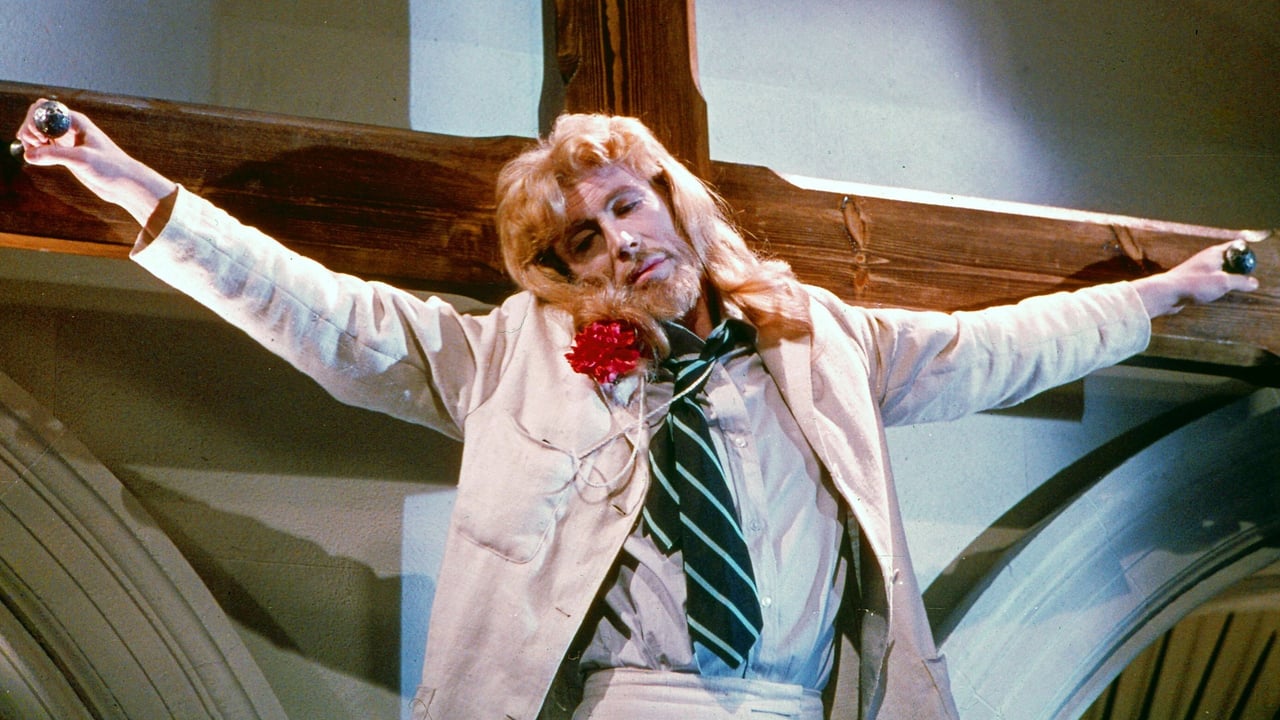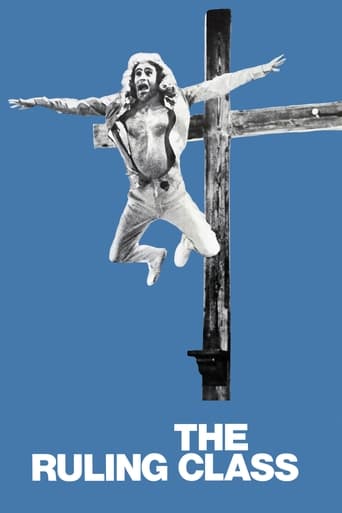

What makes it different from others?
... View Moredisgusting, overrated, pointless
... View MoreIt was OK. I don't see why everyone loves it so much. It wasn't very smart or deep or well-directed.
... View MoreBy the time the dramatic fireworks start popping off, each one feels earned.
... View MoreAristocrat Ralph Gurney, the 13th Earl of Gurney, dies from accidental auto-asphyxiation while dressed in a tutu. His mentally-disturbed son Jack (Peter O'Toole) takes over most of the estate despite his delusions of being Jesus Christ. His uncle Sir Charles and wife Lady Claire are infuriated. Charles and Claire pair up his mistress Grace with Jack. Their plan is to marry them off and send him to an institution. It goes off course as Grace falls for Jack as Dr. Herder tries to cure him.This stage play is filmed without much imagination. It all falls on O'Toole to give this movie life. It's rather flat without him. It tries to skewer the British aristocrats but they are rather easy targets. It's a black comedy with limited laughs. Alastair Sim has a supporting role. This movie needs more O'Toole and limit the scenes without him.
... View MoreThis movie is sometimes brilliant, sometimes silly, sometimes surreal, sometimes tragic, sometimes wickedly satirical, and always schizophrenic (which is the whole point). It's also the only film in which Jesus Christ does the Varsity Drag. Peter O'Toole plays the paranoid schizophrenic heir to an English earldom, and as his relatives try to either cure him or commit him, what we think is being played for laughs slowly becomes something far darker.O'Toole's performance is brilliant, bringing out this man's almost unbearable pain as he tries to hold his mind together by escaping into whatever fantasy world he can manage. Unfortunately, escaping into a world where he is God and everyone loves each other does not work for society, so his family has to snap him out of that so he can become acceptable. At its core, the film is about what kind of insanity (and what kind of god) is acceptable in upper-class British society, and it makes its points on that score very well. But unfortunately, it's far too long; there are so many supporting characters with their own subplots that it gets bogged down in many places. But if you can last through the slow parts, you'll be rewarded with some unforgettable scenes before the end. Seven stars.
... View MoreGross, frequently tasteless satire, much as if Kubrick's "Dr. Strangelove" were transplanted to England's House of Lords and then played at the wrong speed. After the Earl of Gurney accidentally kills himself during one of his fetish games, the 14th Earl--son Jack--is groomed to accept the crown. Once mad Jack--who believes himself to be Christ--undergoes a mental transformation on the night of his son's birth and self-metamorphoses into Jack the Ripper, the plot (thin to begin with) becomes a dartboard for the one-liners (some of which are very funny and are a compensation). Peter Barnes adapted his play for the screen, the kind of material upper-crust audiences like to label 'savage'; he was reciprocated with a game cast and a fine director in Peter Medak, yet these nutty fantasies are merely clotheslines for Barnes to hang his maddening soliloquies on. Peter O'Toole (with cartoony strawberry-blond hair) has some terrific moments early on, particularly in the musical send-ups, but later begins to bellow and rarely stops. The film is too full of targets, and too nasty overall, for its extreme length...it doesn't even look good. ** from ****
... View MorePeter O'Toole becomes the 14th Earl of Gurney, head of one of the richest and most powerful families in England. He assumes the title upon the death of Harry Andrews. When Andrews is buried, the Reverend Alistair Sims comes to the family seeking reassurance that Andrews' having been found dead, hanging by a noose in his own bedroom, doesn't indicate suicide. After all -- burial in sacred ground and all that. Sims is told indignantly, good heavens, the man was wearing a cocked hat, underpants, and a ballet dress -- does that sound like suicide? The rest of the family carry on an intense discussion but every once in a while they're interrupted by a shriek from Sims, to whom realizations come only slowly, and one at a time. "Cocked HAT?" And, later, "Underpants?" And finally, "BALLET DRESS?" It doesn't help that the slightly nutty Andrews, who was in the habit of strangling himself while reciting patriotic speeches, is dead. O'Toole, as his successor, is downright loco.O'Toole believes he is Jesus Christ. He certainly LOOKS the part. He is given long flowing hair with bangs, and a short beard, and with his blue eyes looks exactly like a painting on a post card sold in one of those tourist shops around the Vatican.But if his appearance is bizarre, his beliefs are even worse. He thinks God is love. What an insane idea. In the end another madman changes O'Toole's engrams and turns him into "Jack," his real name. Unfortunately he becomes the wrong person, Jack the You-Know-What. He gives a speech in Parliament praising capital punishment, torture, and so forth, and receives a rousing applause from the assembly. Love doesn't sell. Cruelty wins by a mile.O'Toole described this as a comedy with tragic relief, and that's about it. It presents a pretty shabby picture of human nature, beneath the laughs, or the attempts at laughter, which too often evoke puzzled frowns.Peter Barnes' play was staged in 1968 and presumably written a year or two earlier, a period when the voice of iconoclasm was heard throughout the land, as the 14th Earl of Gurney might have put it before he was electrified.The late 60s were a time of revolution, first outrageously irrational and then violent. The movie may look dated because it so accurately reflects that evolutionary path. Of course some of its zingers never lose their sting. How does O'Toole know he's God? "Because whenever I pray, I find I'm talking to myself." Skewered here are class distinctions, snobbery, religion, love, and anything else you can think of, down to the roots of our cultural being. The problem is that it doesn't seem all that funny to me, not in 2010. There are so many shouts, so much gesticulating, dances that come out of nowhere, an immaterial sequence involving "La Traviata," the cast breaking into old songs like "My Blue Heaven," overacting generally, winks at an audience that already recognizes the joke.Since it's a whimsical, comic, tragic fantasy it needn't stick too close to reality -- actually, it mustn't -- and it doesn't. There's nothing at all amusing about paranoid schizophrenia, which is about the most terrifying form of the disorder. And if you bring together two patients who both believe they are Jesus Christ, you don't get the electrifying confrontation the movie gives us. The psychologist Milton Rokeach already brought THREE patients with the same delusion together and their eyes remained glazed. They were as emotionally flat as always when they were introduced. One commented, "Oh, so you're a cemetery rerise?" All the performances are fine. O'Toole's role is a difficult one but he handles it very well. Who can count the times he's played a madman? It's the would-be disturbing script and the in-your-face direction that keeps this from being the black comedy it wants to be. Sometimes subtlety plays better, as in "Dr. Strangelove," a product of the same period with a similar structure.
... View More